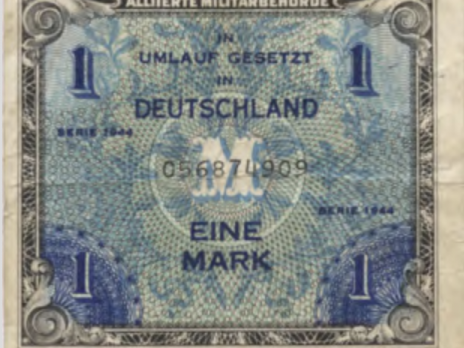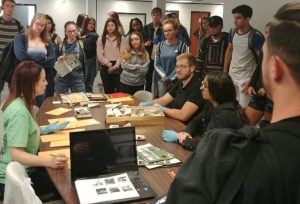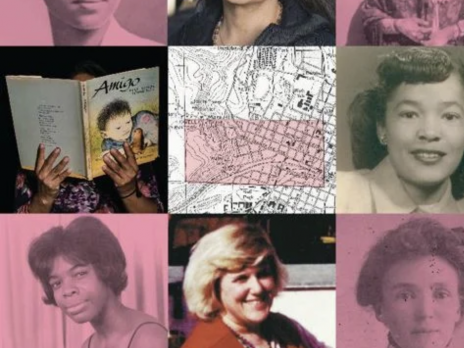Digital Exhibits
Gino Parin: A Complicated Life in Complicated Times
This virtual exhibit is based on a 2023 show created by the Martin-Springer Institute at Northern Arizona University (NAU).
Gino Parin was an artist who lived and worked in Trieste, Italy for much of his life. As a Jewish-born Catholic convert with dual Swiss and Italian citizenship, Gino perished in a Nazi concentration camp in 1944.
The paintings and drawings featured in this exhibit are from the collection of Necki Springer, a family friend of Parin’s who immigrated to the United States and eventually settled in Cottonwood, Arizona.
Stories from the Spanish Civil War
Stories from the Spanish Civil War is a digital humanities project by the Martin-Springer Institute at Northern Arizona University.
What can a simple fan tell us about war? Explore with us the Spanish Civil War through a fan signed in 1938 by men fighting in the International Brigades in support of the Spanish Republic under attack by General Franco’s nationalists and their European fascist allies. On the backside of the fan, thirty-one men from the United States, Canada, and the United Kingdom hand-wrote their names. Who were these men who survived the war? What compelled them to leave their homes to fight fascism in Spain?
This website reconstructs parts of these men’s lives and experiences through traces left in documents and archives. Researched by a student-faculty team, the project explores the Spanish Civil War through two historical artifacts that belong to German-born Arizona resident Bernd Häber. Häber received the fan and the photograph as a young boy growing up in East Berlin from his great-uncle Johann (Hans) Maslowski, himself a member of the International Brigades in Spain. The project focuses on the American volunteers.
Artifacts from the Holocaust and Nazi Germany
Digital Exhibit with the Arizona Memory Project
Various items related to the history of Nazi Germany and the Holocaust were given over the years to the Martin-Springer Institute at Northern Arizona University, in most cases anonymously. The Artifacts from the Holocaust and Nazi Germany collection sheds light on select aspects of life in Germany before, during, and after the Nazi dictatorship. It includes everyday items like currency and chinaware, items that speak to the life under the conditions of World War II, and objects related to Nazi propaganda and the genocide against European Jews (like the official stamp of the camp commander of the concentration camp of Gross-Rosen). The Arizona Memory Project is a service of the Arizona State Library, Archives and Public Records, a division of the Secretary of State. It’s purpose is to make Arizona cultural institutions’ digital holdings available online.

World War II Photographs: The Kuykendall Collection
This collection contains photographs taken by an American GI, James Philip Kuykendall of California, as well as textiles and ephemeral items he collected in Europe during World War II. The collection of over 300 photographs, donated to the Martin-Springer Institute in 2016, depict various scenes and locations in southwest Germany and Nazi occupied Austria from 1942 to 1946. They include photos of James Kuykendall and his comrades, the 65th Medical Group, the liberation of concentration camps at Ebensee, dead Russian slave laborers near Nurnberg, liberated camp inmates, and captured German officers. The collection of photographs and other materials were preserved, researched, identified, and organized by a NAU student team, mentored by the Martin-Springer Institute director and staff.

Resilience: Women in Flagstaff’s Past and Present
This webpage documents the traveling exhibit Resilience: Women in Flagstaff’s Past And Present. It was created under the supervision of the Martin-Springer Institute in partnership with Flagstaff’s Arizona Historical Society. It opened in 2019 at Flagstaff City Hall.
The stories of women presented in Resilience cover each decade from the 1880s to 2020s in Flagstaff, Arizona. Women have been part of Flagstaff’s social fabric from its very beginnings in the 1880s. Through their stories, we can trace societal changes in a former pioneer and mountain town of America’s Southwest. The women covered in this exhibit have something to teach us about resilience in the face of personal hardship and adverse environments, of painful legacies and economic woes.
Collaboratively developed with a NAU student research team under the mentorship of the Martin-Springer Institute and the Arizona Historical Society, this exhibit also received an 11-episodes article series in the Arizona Daily Sun. All the articles and all the panels are included as documents on this website.
If you are interested in the actual exhibit for display at your venue, please contact the Martin-Springer Institute.
